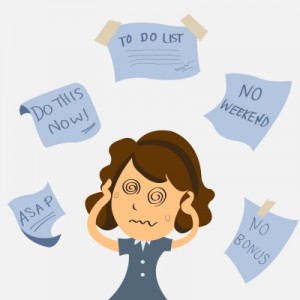“My theory is that every little bit has the potential to help. We just have to learn where to focus our limited time and energy, because obviously we can’t do it all.” —Jody Hedlund
Image courtesy of debspoons at FreeDigitalPhotos.net
I’m up against developing and executing my marketing plan for my debut novel. I awake clenching my teeth.
Whether you’re writing a book or have received a contract, is marketing your book a heavy cloud hovering over your head?
7 Tips to Help Calm You
Tip 1. For over a year, I’ve saved emails from writers’ email loops and my subscriptions to book-promotion blogs. These emails contain others’ experiences or links to posts, articles, and websites I might use in promoting my novel.
I’ve also collected workshop handouts and purchased how-to e-books.
Examples: Emails that recommend website designers, give newsletter writing tips, or provide links to order bookmarks. An e-book showing how to use Twitter in a marketing plan.
Ahh. Most of my research is already at my fingertips.
Tip 2. About six months from my book’s release date, I scheduled weekly readings from my saved items in Tip 1. Now promotion ideas, how-tos, and processes are fast becoming familiar.
Ahh. I’ve gained confidence in what I need to do.
Tweetable
- Learning steps, details, and processes lessens our marketing-plan stress. click to tweet
Tip 3. From my readings in Tip 2, I listed all the projects I could do to promote my novel.
Ahh. I got them all out there so none lurk to worry me later.
Tip 4. I assigned the tasks from Tip 3 to the months I’ll need to work on them. Wow. About 375 tasks over six months!
Family, health, and excellence of projects are more important than doing all the tasks. So, I determined the projects that were MUSTS.
Examples: Obtaining a website. Getting book endorsements. Scheduling interviews on blogs that readers frequent.
From the information I gathered in Tip 1, I tagged additional projects experts said were worth the effort. Then, I noted which months were overloaded. From these two factors, I chose the projects I’d pursue.
Examples: Focus mainly on Twitter. Join a meet-the-authors Facebook party. Hold a local launch party.
I may implement the rejected projects on my next book’s marketing plan.
Examples: A blog tour. Writing articles for publications. A Facebook launch party.
Ahh. I’ve whittled down the projects I’m going to work on.
Tweetable
- Excellence doesn’t mean you have to do everything to promote your book. click to tweet
Tip 5. Now, I’m scheduling needed people for my projects. I’m doing this early so this task doesn’t loom over me.
Examples: Hosts and helpers for the local book launch party. An artist to “beautify” my give-away baskets containing novel-related goodies. Local bookstore owner to schedule events.
Ahh. I feel like I have a team behind me.
Tip 6. I always start a week with a written list of tasks I’ll complete each day. I make sure tasks are “bites” of the project, not projects in themselves.
I’m mindful not to sabotage my progress by starting unscheduled tasks because they’re “good” or fun to do.
Ahh. I can relax. Time is scheduled for each task.
Tweetable
- Often we’re overwhelmed because we work on unscheduled, “good” tasks. click to tweet
Tip 7. For me, praying God’s direction on everything is a must.
Ahh. I’m in His will.
How do you add serenity to your marketing plan?














 RSS - Posts
RSS - Posts